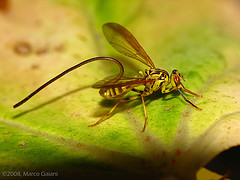Interactions
Papaya Pests
 |
| Picture provided by Marco Gaiani |
Since C. papaya makes its own food, it does not need to feed on another organism but it does serve as a food source to other organisms such as you and me. Carica papaya and its growers also have to worry about other pests that may infect their crop. A major pest of the plant is the papaya fruit fly (Toxotrypana curvicauda). This pesky little insect deposits its eggs in the fruit of the plant. The eggs develop into larva which infects the whole fruit making destroying it. This can be a problem when growing C. papaya commercially because it not only destroys the crop but it is hard to protect against on a large scale. Home growers can protect their plants by covering them with a paper bag. This has to be done right away and the bag needs to be changed every 10 to 14 days.
A papaya a day,
keeps the doctor away.
Carica papaya is grown commercially all around the world, but why?
It turns out that not only does this plant produce a tasty fruit; it
is also very good for your body. Believe it or not, C. papaya has
many medicinal purposes for humans. Carica papaya contains an enzyme
called papain which is found in large quantities in the skin of
unripened papayas and can is also found in the leaves, latex, and
roots of the plant. The reason this enzyme is so important is
because it helps break down proteins. This makes it useful as a meat
tenderizer but more importantly, people use it to help with
digestion. If you take the enzyme, it helps the body to break down
not only large proteins but also smaller peptides. The papain
is also useful to the body in many other ways.
Anti-Inflammatory
Carica papaya
works as an anti-inflammatory.
The papain produced in the papaya reduces inflammation which
helps with a number of diseases in which inflammation causes
problems such as arthritis and asthma.
A study was performed on rats to test this and the results
showed that inflammation went down in rat paws treated with
C. papaya extract.
(Check out the study
here.)
Ointment
Papapya can be used as an ointment to treat rashes, burns and cuts. It also helps to relieve pain from jelly fish stings.
Malaria Protection
Carica papaya can be made into tea. In countries where malaria is prevalent, the tea is consumed to protect against the disease.
Male contraceptive?
|
|
Carica papaya seed extract has been shown to temporarily reduced the fertility of males in rats. A study was conducted at the University of Calabar on rats to examine male reproductive physiology. These rats were divided into groups and treated with C. papaya seed extract. All the rats abstained from having sex for 7 days. After the 7 day period, the rats were divided up again. Some were mated with fertile female rats and others were used for semen analysis and testis histopathology. |
| The results of this study were that the rats that were treated with the C. papaya extract had a lower sperm cell count, sperm cell degeneration and induced testicular cell lesions. It also seemed to prevent fertilization of the female ovum. The conclusion of this study was that oral consumption of C. papaya seed extract could stimulate reversible male infertility. This is useful because it could then be used to create an oral contraceptive for males. For more information about this study, check out the full article here. |
 |
|
|
Another study
was done on male dogs, but looked at
the difference between washed and
unwashed papaya seeds.
Both
groups saw a decline in sperm
motility and production but the
group given the extract from the
washed seeds saw a faster decline.
|